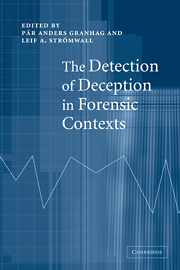Book contents
- Frontmatter
- Contents
- List of figures
- List of tables
- List of contributors
- Part 1 Introduction
- Part 2 Lie-detection techniques
- 2 Discerning lies from truths: behavioural cues to deception and the indirect pathway of intuition
- 3 Statement Validity Analysis and the ‘detection of the truth’
- 4 Reality monitoring and detection of deception
- 5 The psychophysiological detection of deception
- Part 3 Special issues facing a lie-catcher
- Part 4 Enhancing lie-detection accuracy
- Part 5 Conclusions
- Index
- References
5 - The psychophysiological detection of deception
Published online by Cambridge University Press: 22 September 2009
- Frontmatter
- Contents
- List of figures
- List of tables
- List of contributors
- Part 1 Introduction
- Part 2 Lie-detection techniques
- 2 Discerning lies from truths: behavioural cues to deception and the indirect pathway of intuition
- 3 Statement Validity Analysis and the ‘detection of the truth’
- 4 Reality monitoring and detection of deception
- 5 The psychophysiological detection of deception
- Part 3 Special issues facing a lie-catcher
- Part 4 Enhancing lie-detection accuracy
- Part 5 Conclusions
- Index
- References
Summary
The psychophysiological detection of deception: an applied psychology with a long history and wide application
The use of physiological measures to detect deception, known variously as the psychophysiological detection of deception (PDD), lie detection and the polygraph, has a history in psychological science that goes back to the end of the nineteenth century (Lombroso, 1895). Although applied interest in PDD was primarily an American phenomenon during most of the twentieth century, international application, research and interest has expanded rapidly in recent years (for reviews see Barland, 1988; Honts, Raskin and Kircher, 2002).
PDD is applied in a variety of settings for a variety of purposes. In some jurisdictions in the United States the results of PDD tests are admissible as evidence in legal proceedings. In many countries law enforcement uses PDD as an investigative tool to check the veracity of suspects and informants. PDD can also be used as a pre-employment screening tool to verify a person's credibility as part of the vetting process. In the United States, PDD use in the national security system to screen for persons engaged in hostile actions against the government is ubiquitous. Finally, a recent phenomenon in the United States is to use the polygraph as part of the release programme for convicted sex offenders. As a condition of release, convicted sex offenders are required to take and pass periodic polygraph tests concerning new sex offences or other prohibited behaviour.
Information
- Type
- Chapter
- Information
- The Detection of Deception in Forensic Contexts , pp. 103 - 124Publisher: Cambridge University PressPrint publication year: 2004
References
Accessibility standard: Unknown
Why this information is here
This section outlines the accessibility features of this content - including support for screen readers, full keyboard navigation and high-contrast display options. This may not be relevant for you.Accessibility Information
- 22
- Cited by
